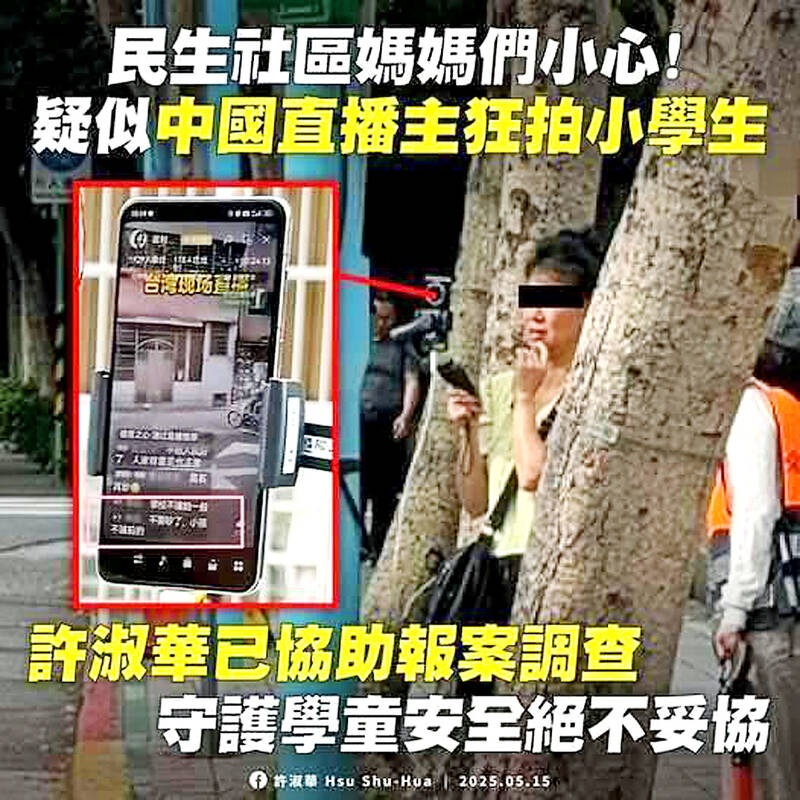National security authorities have initiated investigations into whether the Chinese Communist Party (CCP) is behind a spate of illegal entries by Chinese boats and alleged cases of Chinese livestreaming students’ activities around schools in Taiwan, a source said on Sunday.
Two Chinese — a father and son — on May 16 used a rubber dinghy to illegally arrive at Taoyuan’s Guanyin Beach (觀音海水浴場). They were arrested shortly afterward.
A Chinese online influencer named “Shandong Kaiko” (山東凱哥) on May 18 posted a video on social media claiming that he had stowed away to Taiwan and planted the Chinese national flag at a site on the coast of Taoyuan’s Dayuan District (大園).

Photo courtesy of the Coast Guard Administration
The Coast Guard Administration on Friday last week apprehended a Chinese after he attempted to swim to Kinmen County’s Dadan Island (大膽島) using a flotation ring.
An official familiar with the cross-strait situation speaking on condition of anonymity on Sunday said that sailing a rubber boat to Taiwan is against the law.
Whether such attempts were made by human trafficking groups or by the Chinese People’s Liberation Army to test Taiwan’s coastal defenses and conduct infiltration activities, authorities would consider all possibilities and impose strict regulations, the official said.

Photo: Screengrab from Hsu Shu-hua’s Facebook page
Illegal entries have proliferated and they do not seem to be regular public order contraventions, although in some cases Chinese appeared to takes photographs at the beach while traveling in Taiwan, the official said.
Regarding Chinese livestreaming students at schools in Taiwan, the official confirmed that such incidents occurred at several schools almost at the same time.
These cases are suspicious and authorities are investigating whether certain people or CCP-backed organizations were operating to threaten Taiwan’s national security or commit crimes, the official added.
The government is aware of the suspected cases of livestreams, which have been reported to the National Immigration Agency and security agencies, the official said.
To safeguard societal resilience, citizens encountering such unusual situations are advised to report them to authorities, they said.
Taiwan has rule of law and infringing upon freedoms or causing panic among students in pursuit of online traffic is intolerable, the official said, adding that the motivation behind such behavior needs to be further understood.
Separately yesterday, a Chinese national is being investigated for suspected offenses against privacy after live streaming elementary school students getting off from a school in Taipei, said the Songshan police precinct.
The case was brought to light by Taipei City Councilor Hsu Shu-hua (許淑華), who described the May 15 incident, which happened in the city’s Minsheng community, in a Facebook post.
Hsu said that concerned parents told her a Chinese man was allegedly filming their children and streaming it on Douyin, despite being repeatedly told not to. The streamer had already left when police arrived, but footage from nearby surveillance cameras allowed them to identify the person, a woman surnamed Liu (劉), the police said.
Liu, a 52-year-old Chinese who is married to a Taiwanese and lives near the school, was tracked down the following day.
She told police she was simply sharing her daily life in Taiwan, as well as local customs through livestreams.
Filming people without their consent might infringe upon their portrait rights, and distributing images of minors online could contravening the children and youth protection law, police said.
Additional reporting by CNA

Right-wing political scientist Laura Fernandez on Sunday won Costa Rica’s presidential election by a landslide, after promising to crack down on rising violence linked to the cocaine trade. Fernandez’s nearest rival, economist Alvaro Ramos, conceded defeat as results showed the ruling party far exceeding the threshold of 40 percent needed to avoid a runoff. With 94 percent of polling stations counted, the political heir of outgoing Costa Rican President Rodrigo Chaves had captured 48.3 percent of the vote compared with Ramos’ 33.4 percent, the Supreme Electoral Tribunal said. As soon as the first results were announced, members of Fernandez’s Sovereign People’s Party

MORE RESPONSIBILITY: Draftees would be expected to fight alongside professional soldiers, likely requiring the transformation of some training brigades into combat units The armed forces are to start incorporating new conscripts into combined arms brigades this year to enhance combat readiness, the Executive Yuan’s latest policy report said. The new policy would affect Taiwanese men entering the military for their compulsory service, which was extended to one year under reforms by then-president Tsai Ing-wen (蔡英文) in 2022. The conscripts would be trained to operate machine guns, uncrewed aerial vehicles, anti-tank guided missile launchers and Stinger air defense systems, the report said, adding that the basic training would be lengthened to eight weeks. After basic training, conscripts would be sorted into infantry battalions that would take

GROWING AMBITIONS: The scale and tempo of the operations show that the Strait has become the core theater for China to expand its security interests, the report said Chinese military aircraft incursions around Taiwan have surged nearly 15-fold over the past five years, according to a report released yesterday by the Democratic Progressive Party’s (DPP) Department of China Affairs. Sorties in the Taiwan Strait were previously irregular, totaling 380 in 2020, but have since evolved into routine operations, the report showed. “This demonstrates that the Taiwan Strait has become both the starting point and testing ground for Beijing’s expansionist ambitions,” it said. Driven by military expansionism, China is systematically pursuing actions aimed at altering the regional “status quo,” the department said, adding that Taiwan represents the most critical link in China’s

EMERGING FIELDS: The Chinese president said that the two countries would explore cooperation in green technology, the digital economy and artificial intelligence Chinese President Xi Jinping (習近平) yesterday called for an “equal and orderly multipolar world” in the face of “unilateral bullying,” in an apparent jab at the US. Xi was speaking during talks in Beijing with Uruguayan President Yamandu Orsi, the first South American leader to visit China since US special forces captured then-Venezuelan president Nicolas Maduro last month — an operation that Beijing condemned as a violation of sovereignty. Orsi follows a slew of leaders to have visited China seeking to boost ties with the world’s second-largest economy to hedge against US President Donald Trump’s increasingly unpredictable administration. “The international situation is fraught